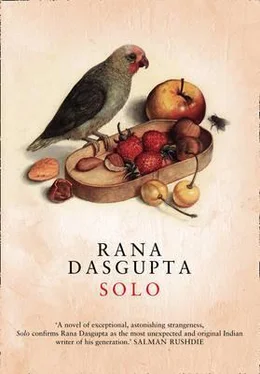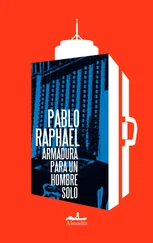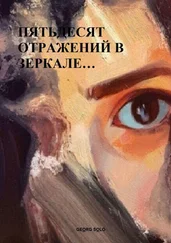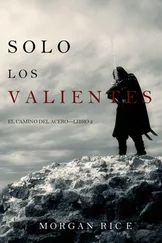They finished eating and packed everything into the van.
‘Come on.’
Boris climbed in, and they drove to the hall where the evening party was happening. In the back of the van were their speakers which they carried inside, and Boris followed behind with Slavo’s violin, which he held as if it were a fledgling bird fallen from a nest. Some men were laying food out on the tables, and there were decorations on the ceiling. The musicians set up amplifiers and stands and plugged cables into sockets that set off electronic screams. Petko warmed up on his clarinet. Boris sat on the stage kicking his feet. They had offered him a sandwich. He had driven in their car.
The kaval player stood at the back semaphoring while they adjusted volumes. There was a lot of time before everyone arrived from the wedding.
A woman put out flowers on the tables. Petko tossed his song with a honey tone, and the fluorescent lights went on. The tapan was like the pounding of the earth through the speakers, it was a beating and a life! and there were trestles all along one wall that made a great corridor underneath where a boy could hide away from everything, under the tablecloths, under the dishes and cakes that the guests would eat; then the kaval player took up his flute and began to play and all of them joined in the tune, the whole band playing in this empty hall, the arabesque jaunt, the newcomer’s flaunt — and he, Boris, in the offbeat, in the heartbeat. The clarinet sang nar-whal nar-whal with its elbow-vowels like treasured smells, and over it the silvery lattice of the violin. And Boris thought, He is one of us .
Boris’s grandmother was at first indulgent towards his sudden involvement with the Gypsy musicians. He is young, and it will pass , she thought; and she did not prevent him from going every day to that part of town. She did not object to the old violin the Gypsy gave to her grandson, and she listened patiently to his tales of music and learning. She even spoke to others of the remarkable aptitude he showed for his instrument.
But Boris’s enthusiasm for the Gypsies began to extend too far. He started to use slang and mannerisms that appalled her. He played nothing but Gypsy music. She said,
‘You should spend less time with Slavo. The music you play is all illegal — where will it get you?’
But Boris loved his new teacher, and nothing could keep him away.
Slavo said,
‘Now we’ll play an hour of our lives.’
He raised his violin and played the things of sixty minutes. The colours, the thought. The unclipped nails, the oval pool of vision. The time, the need, and the sounds that break through from beyond. The book on the fence post. The other person drawing close. The normal emotions, the thing-at-hand, the body’s suck and pump.
He did it in a couple of moments, which was another part of the feat.
Boris tried too. To play an hour of his life on his own violin. But he did not know how, and his sound spoke of nothing at all.
Boris was intimidated by Slavo, who was a man where he was only a boy. In the cleft of Slavo’s open shirt was a chest of hair hung with chains, and he had manly concerns that sometimes kept him silent and thoughtful for minutes on end. Next to him, Boris felt he did not occupy space adequately or well. While Slavo did other things — while he spoke on the phone, or discussed business with his brother, or simply looked meditatively out into the street — Boris was not sure how to be. He was certain of himself only when he was playing.
Slavo said,
‘Let’s try to play a person who looks at an angry crowd. I will play the crowd. You play the person who looks into all the furious eyes.’
At such moments, both of them were entirely involved, and happy.
One day, the chemical plant shut down. Almost everyone worked there. Boris’s own father had been a hand there, and most of the men he knew. The plant set the rhythms: the buses came in the mornings to pick people up and to drop off those who had worked through the night. And suddenly it closed: the gates were padlocked, the yellow plume disappeared, and with it that omnipresent, tangy smell.
It was remarkable how quickly the town emptied. There was no slack in the lifestyle, for salaries had not come for months. With the factory gone, the economy immediately seized up: shopkeepers could not buy in supplies, there was no petrol, no beer, no bread. So the people locked up their houses and piled together in clanking cars, and set out for the cities. Every evening the diminishing bar talk was of those who had gone and those who had still to go.
In their frustration, they pulled down the statue of Lenin that had always stood in the town square. Boris was shocked, for the old man had always pointed to the future, and with his other hand he had gripped his lapel in a permanent way. Now his outstretched arm had broken off, and it was hollow inside, and he lay unclaimed on the ground. Boris wondered whose job it was to clear fallen statues away.
The mayor was among the last to go. All the remaining townsfolk came to the big house to help load trunks and paintings and squawking chickens into the car. The mayor’s wife came out first, leading his confined brother, Old Petar. Everyone was appalled to see him, the man whom everyone could remember for his feats of physical strength now shuffling like a vacant idiot and leaning on his brother’s wife for support.
She sat him in the back of the car among the coats and photographs. The mayor wore his best suit, and shook with grief.
‘Goodbye to you all!’ he cried. ‘Goodbye to our beloved town! Goodbye to these streets!’
He looked around him mightily.
‘Fate has spoken, and we have no choice but to bend. I loved you all! I hope you find a place in this godforsaken future! Forgive me! Goodbye to you all!’
He got into the car, wiping his eyes with a handkerchief. The engine jerked to life, and the laden vehicle moved slowly away. Everyone waved. Still driving, the mayor stood up through his open window, clutching the air and shouting into the wind, ‘Farewell! May we meet again!’
Boris’s school gathered its eight remaining pupils together for an official closing day, with prayers for the future. The petrol station closed, the pharmacy, all the restaurants. His last friends departed, and all the faces that had made up his childhood.
Boris went to Slavo’s house and found it empty. The whole Gypsy precinct had emptied, in fact, without anyone seeing them go. He broke a window of the house and climbed in; he sat in Slavo’s room and sobbed. The man had gone with no acknowledgement or sign. The house was a scene of hurried departure: unwashed plates still lying on the table, unwanted clothes abandoned on the bedroom floor, an overturned chair, and posters that had been ripped away from the ghost-line of their four pinned corners. Slavo had left some gramophone records which Boris claimed and took away.
He walked back home through the empty streets, and ran upstairs. He climbed out of his bedroom window, up the drainpipe and on to the sloping, red-tiled roof. Steadying himself against the chimney, he took the gramophone records out of their sleeves and spun them angrily into the distance. One by one he flung them, black glinting circles against the sky, spinning too fast for music, and crashing, finally, into pig troughs and lamp-posts and bus shelters and front doors, all of which had lost their own voices, and made no protest.
Boris’s grandmother chose not to leave. ‘What will I do in a strange city?’ she asked as she paced in the house. ‘It’s all very well for those who have sons and daughters to show them the way. But my daughter is gone. At least here I know how to survive. I grew up on what I planted and tended, and I can die that way, too.’
Читать дальше
Конец ознакомительного отрывка
Купить книгу












